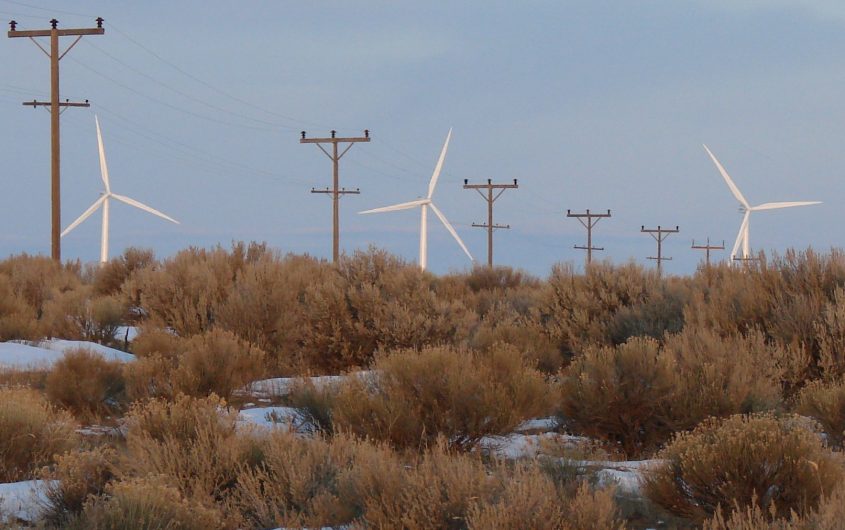
Chrishna via Flickr
Texas Grid Failure

Tahlia Mullen
Tahlia Mullen is a research intern at AICGS for the spring of 2021. She prepares briefing material, manages databases, supports the research projects of resident fellows, and helps to organize and document AICGS events.
Currently, Ms. Mullen is pursuing a BA at Dartmouth College in Government with a concentration in International Relations and a minor in Environmental Studies. Her coursework and research interests focus primarily on the Transatlantic relationship, and climate and energy policy. She also enjoys studying German language and history.
Ahead of coming to AICGS, Ms. Mullen conducted research with Dartmouth College’s Political Violence Field-lab assessing the impacts of humanitarian aid projects in Afghanistan. She also completed an internship at the Maine Center for Economic Policy. Upon completing her BA, Ms. Mullen plans to pursue a graduate degree in International Relations.
Lessons from Germany
As the climate crisis continues to worsen, humans globally are faced with a decision: learn to adapt or face the consequences of sticking to business as usual. Perhaps no area is in greater need of reform than the energy sector. The scientific consensus is that decarbonization is needed to limit current and future CO2 emissions, but as societies decarbonize, they are also taking steps to build more resilient energy grids to meet growing electricity demands and extreme weather. The consequences of inaction may be severe, as seen in the state of Texas during a recent winter storm. Unusually low temperatures triggered a spike in energy demand, leading 185 generating units to trip offline. Meanwhile, West Texas wind turbines froze, and power plants lost access to natural gas. The result was a multi-day blackout leaving millions without electricity.
In the days since power has come back online across the state, the conversation has turned to what went wrong. Apart from Texas being notoriously isolated from larger, regional power grids, the disaster is largely attributed to a lack of regulatory oversight in the state’s energy sector. The state relies on market incentives alone to encourage energy provision, meaning that when providers fail to supply electricity, they face no penalty. It also means that providers have an incentive to take hazardous cost-cutting measures in order to remain competitive within the energy market. These measures include opting not to winterize equipment or to maintain reserve margins of electricity above anticipated demand.
As Texas reflects on what can be done to prevent such a catastrophe from occurring in the future, government officials and industrial leaders can look to inspiration from abroad. Germany is one country that has taken decisive action to improve the coverage, security, and sustainability of the national energy grid. A clean energy transition is well underway in Germany. Wind and solar account for an ever-greater share of the nation’s electricity; however, the growth of renewables varies across regions. Wind and solar installations are most concentrated in the north, meaning electricity must travel a great distance to reach the energy-hungry regions to the west and south. As the average distance between electricity generation and consumption increases, the existing German power-grid is increasingly vulnerable to disturbance. That vulnerably is compounded by more frequent extreme weather events, like prolonged summer heatwaves, which result in unplanned spikes in electricity demand that put a strain on energy infrastructure.
The Federal Ministry for Economic Affairs and Energy recognizes that energy grid expansion and restructuring are necessary to improve the reliability and sustainability of German energy. With the help of public participation and industrial actors, the federal government aims to determine current and future energy needs and develop policy goals that inform grid development plans. They have created a four-part legislative package to help achieve these ends. It begins with the Energy Industry Act, a framework policy guaranteeing annual grid expansion planning, with a particular focus on offshore grid expansion. On January 29, the Bundestag passed a provisional change to this act allowing large batteries to be used for energy storage regulation and jointly passed the Grid Expansion Acceleration Act, which aims to streamline the planning and approval process of grid projects between now and 2030. These two laws are accompanied by the Federal Requirement Plan and the Power Grid Expansion Act, which locate priority expansion projects at the national and state level, respectively.
In contrast to Texas, Germany has taken a centralized approach to grid expansion and development. The four-part legal framework for grid expansion originates at the federal level but engages with regional and local actors, as well as members of the public and the energy industry. In designing this legal framework, Germany has also allowed for greater regulatory oversight throughout the planning, construction, and operational phases of energy grid development. Texas could do the same. As the state develops its power grid to address the vulnerabilities revealed in February, public officials could play a more outsized role overseeing the process, enlisting help from public planning boards and independent commissions to inform the direction grid development takes. Equally, greater regulatory oversight could mandate investment in safeguards against extreme weather and sudden energy spikes.
Although there are differences between the energy profiles of Germany and Texas, they are sufficiently similar that lessons from one may be applied to the other. Like Germany, Texas wind farms are most concentrated in less populous regions of the state, meaning wind-generated electricity often travels great distances to reach consumers and is thus more vulnerable to disturbance relative to more locally generated energy. Additionally, the construction of the Nord Stream 2 pipeline from Russia signals that Germany is committed to expanding its reliance on natural gas alongside renewables, which must be considered as Germany expands its energy grid. Furthermore, both Germany and Texas, like much of the world, have become more frequent victims of extreme weather. Although Texas is less prepared against extreme cold and Germany against extreme heat, both phenomena result in sudden spikes in electricity demand that strain the electricity grid in unexpected ways.
It is widely agreed that the winter storm in Texas this February and subsequent multi-day blackout revealed substantial vulnerabilities in the state’s power grid. As the state recovers from the incident, public officials must consider how best to prevent such a disaster from occurring in the future. Grid development projects like the one occurring across Germany provide a valuable case study. Were Texas to allow more centralized planning and regulatory mandates throughout the grid development process, rather than relying on market incentives alone, energy disasters like the one in February may be averted in the future. Investments aiming to increase grid reliability could be the difference between whether or not millions are left cold and in the dark during future extreme weather events.








